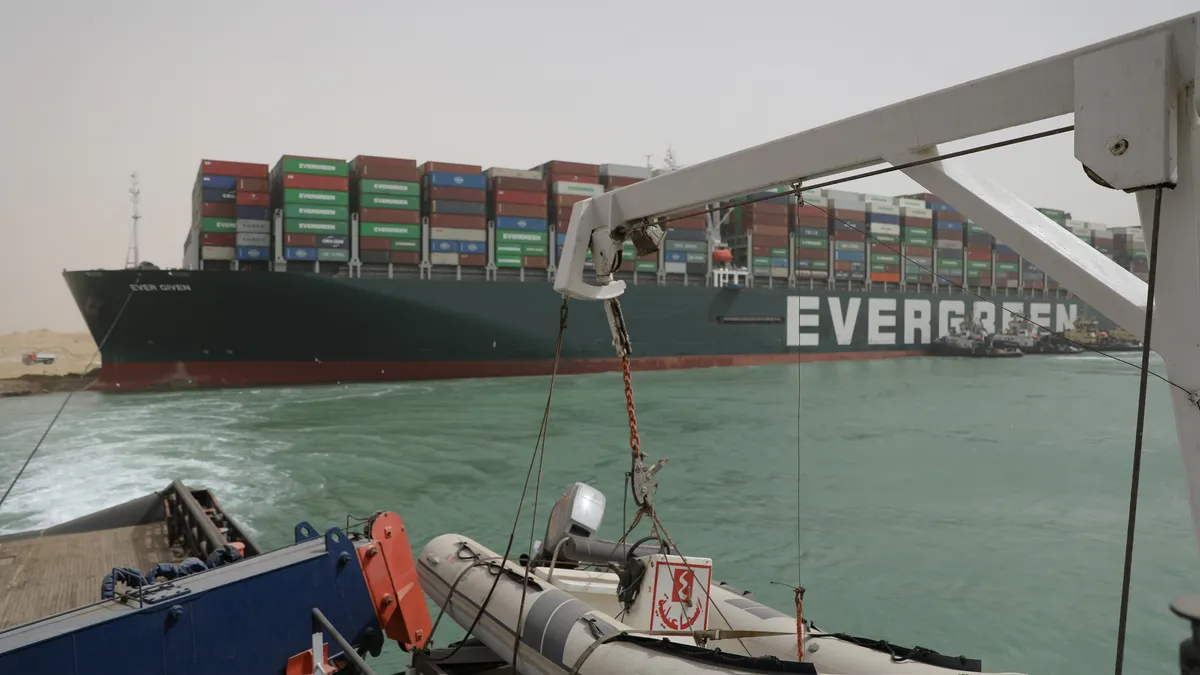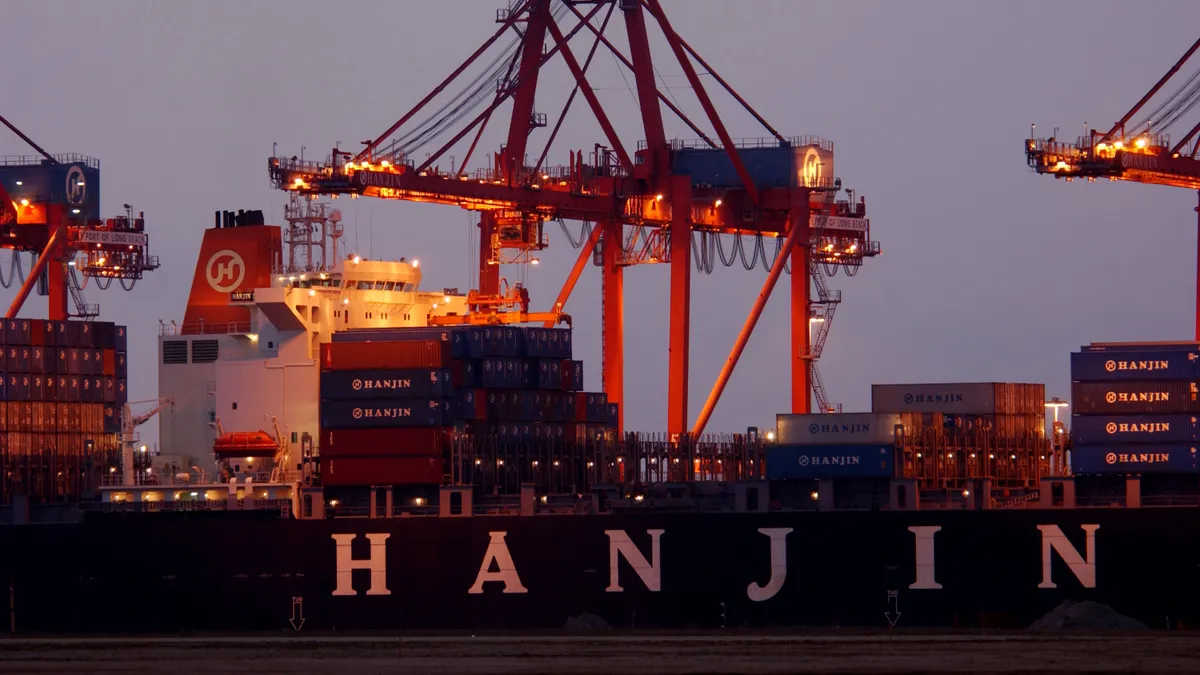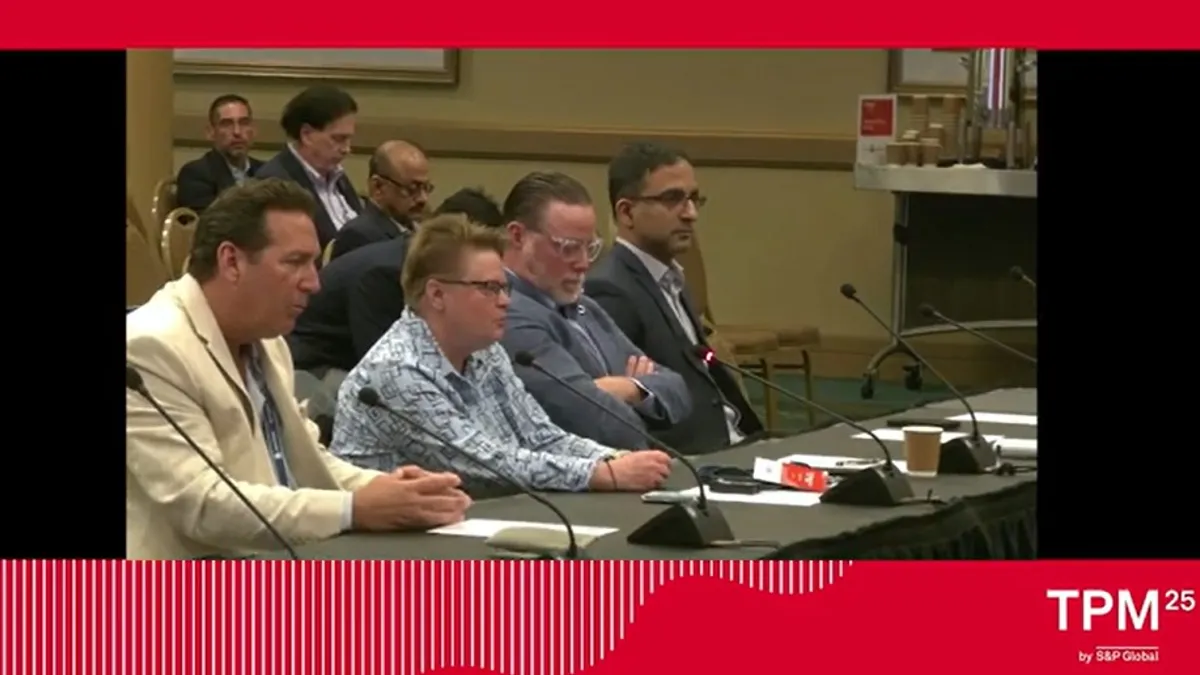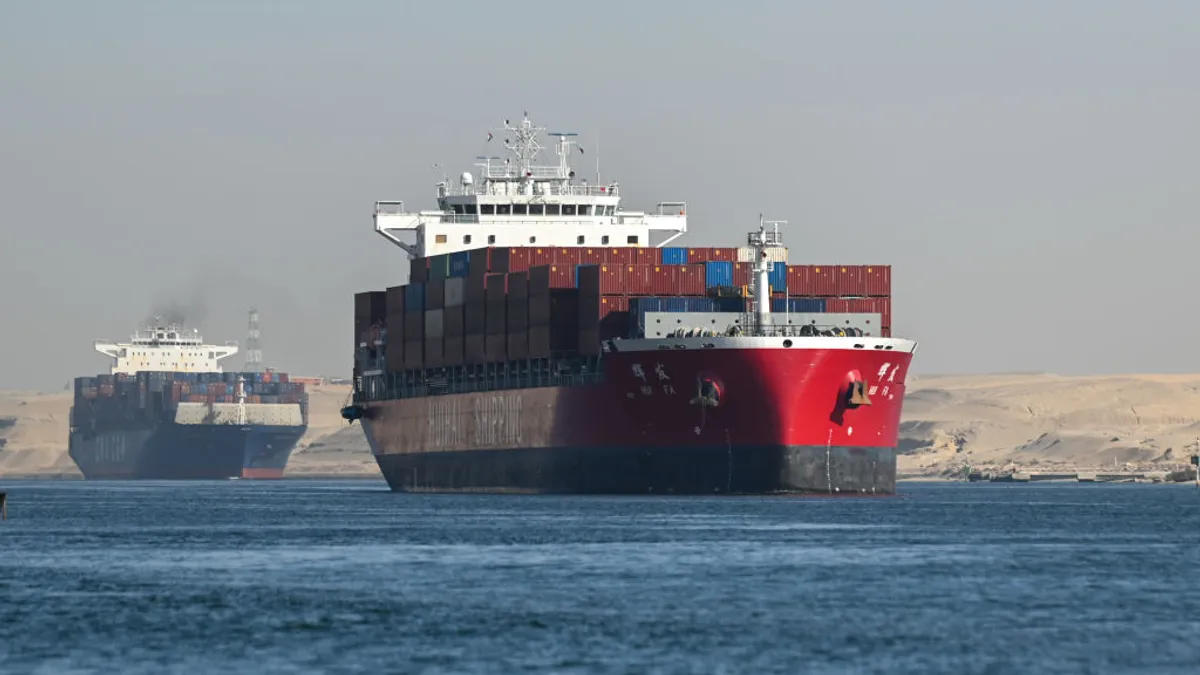The owner of the Ever Given notified Evergreen on April 1 that it declared a general average following the work to refloat the ship in the Suez Canal last month, a spokesperson for the operator confirmed to Supply Chain Dive.
The Ever Given was stuck in the canal for six days, and the effort to get it moving again required more than a dozen tug boats and multiple dredgers. Egyptian authorities recently said they could seek more than $1 billion in damages to cover equipment used to free the ship, the 800 people that worked to free the ship and the loss of canal revenue, according to a CNBC report citing Egyptian media coverage.
Egypt did not say who would be responsible for paying the $1 billion in damages. But the declaration of a general average by Shoei-Kisen, the ship's owner, means that shippers will be required "to share the relevant expenses incurred in ship rescue," the Evergreen spokesperson explained.
The size of the Ever Given and the number of cargo owners involved means the general average process will likely be lengthy and complicated, according to Jonathan Spencer, an average adjuster at The Spencer Company, which is not involved in the case.
"No two cases are the same," Spencer said. "But this is, I'm pretty sure, the largest general average case that has ever arisen in terms of the number of different property interests."
Determining the payment
Sharing the cost of major expenses is at the heart of what a general average declaration means for shippers, according to Sean Pribyl, a senior counsel at Holland & Knight who focuses on maritime law. Pribyl is not involved in the Ever Given case and spoke broadly about general average.
"It's this idea of equitable sharing between a shipowner and cargo interest of certain losses, and that includes expenses that occurred during the voyage," Pribyl said.
General average is an old concept dating back hundreds of years that has evolved over time with the shipping industry. Cargo would occasionally need to be thrown overboard in emergency situations to lighten loads and save the ship. General average arose to help spread this loss, Pribyl said.
"These are extraordinary sacrifices made, or they are expenses incurred, to avert a peril that threatens the entire voyage, so it doesn't have to be jettison anymore. It's definitely matured over now several centuries," he said.
"This is, I'm pretty sure, the largest general average case that has ever arisen."

Jonathan Spencer
Average adjuster at The Spencer Company
These days, the general average terms are outlined in a shipment's bill of lading and can cover a long list of expenses, including towing and salvors. Lost revenue for the canal, however, would not fall under general average, according to Spencer.
The job of determining how much the shippers will have to pay is up to an adjuster. The adjuster in the case of the Ever Given is Richard Hogg Lindley, according to documents obtained by The Loadstar. The process requires getting in touch with all of the shippers that had cargo on board.
"The average range is anywhere from two years to seven years," Pribyl said. "It could take quite some time."
But this doesn't mean cargo owners will have to wait until the adjustment is done to get their cargo. Shippers are usually able to pay the general average security or guarantee to release their cargo well before the adjustment is complete.
"It's not usually laid out in the bill of lading," Spencer said of the guarantee amount. "It is based on the cargo invoice. So the adjuster has to assemble all that information before he can determine what deposit needs to be put up by individual cargo interests."
The last time a large container vessel declared a general average was in 2018 following the fire aboard the Maersk Honam. The fire happened in March and shippers were able to pay to release their cargo by May.
Cargo owners aboard the Honam had to pay 54% of the cargo's value to get it released, which was described as being 42.5% of the cargo value for the security, plus 11.5% as deposit on the general average, according to an MSC press release from the time.
A shipper's insurance will typically cover the guarantee and other fees associated with the general average. Though Spencer said it is "surprising the proportion cargo interests who choose not to buy insurance although it's a relatively cheap."
"If no insurance is in place, then a cash deposit will be needed," the British International Freight Association said in a note about the Ever Given declaring general average.
General average and adjustments via forwarders
As of Thursday, the Ever Given was still in Great Bitter Lake, so it's not clear when it will resume its journey and cargo will be available to the owners. "Shippers with cargo aboard the MV Ever Given will be in for lengthy waits for their containers to be released," the International Federation of Freight Forwarders Associations said in a note on Thursday.
The process is the same when a cargo owner books through a freight forwarder, but it can be more complicated, Spencer said.
"Because when cargo is through a freight forwarder, the average adjuster then has to ascertain from the freight forwarder who the ultimate cargo owner is," he said.
When the adjustment is done, the adjuster will deliver the average adjustment to all of the stakeholders, Spencer said.
"That serves as notice to those interests," he said. "In the case of insurance companies, who have guarantees, how much they are expected to pay. In the case the cargo interests who have lodged cash deposits, what contribution is to be made as to deposit funds and how much they will get refunded."
Adjusters will typically include a "margin of safety" when collecting a guarantee deposit, so it will likely be higher than what the contribution is expected to be, but these differences will be refunded.
Evergreen said its insurance will cover the carrier's container, fuel and other assets to help "reduce the risk of cost sharing."
"Evergreen has also notified customers who have cargoes on the ship and its alliance partners who used the capacity of this ship to provide deposits or surety bonds for sharing the salvage costs in accordance with the general average adjustment rules before the cargoes can be released after the ship arrives at destination ports," the company spokesperson said.






















